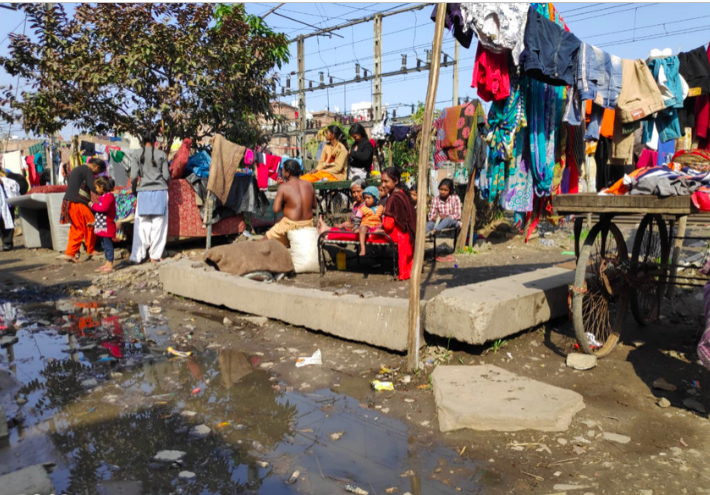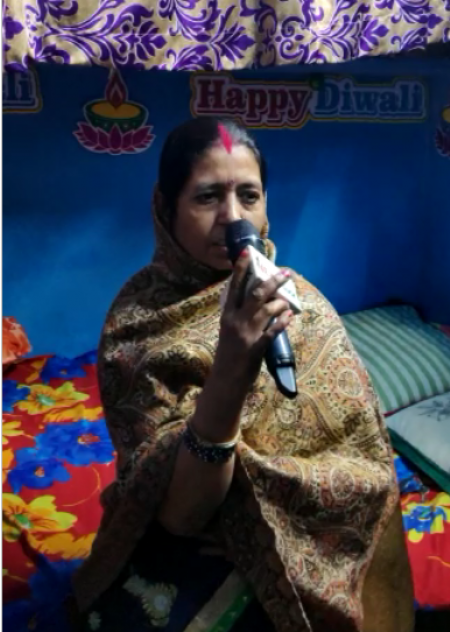Delhi Elections: Factory Workers’ Issues Missing, While ‘Communal Propaganda’ Flares Up

Inside the crammed lanes and small rooms in the Wazirpur industrial area of Delhi, live the city’s industrial backbone – its factory workers. Here, over 50,000 eligible voters are awaiting recognition of their issues by political parties. As the date of Assembly elections in the national capital (February 8) draws closer, the workers’ issues are conspicuously missing from the election agenda of the contesting parties.
In the narrow lanes of the makeshift residential colony set up next to the railway line, Gorakh, a migrant factory worker from Bihar, is sitting in a squalid room that houses a family of six. He says, “We are grateful we have water here, on most days it felt like a distant dream. For political parties, we remain vote banks and not humans with needs. If we raise our demands, I will have to face the consequences from the factory owners.” Most residents of this area, like Gorakh, are migrant workers working in small-scale factories of the region.

This room is all there is to Gorakh's house.
Apart from pathetic living conditions, the workers slog for over 12 hours, making half or less than half of the minimum wage. NewsClick inquired among the workers for their monthly wages and most answered with an average figure of Rs. 5,000-8,000.
Also read: Delhi Elections: Who Is Talking About Jobs and Wages?
As NewsClick has reported earlier, a casual labourer in Delhi earned about Rs 376 per day in the first half of 2018, according to the Periodic Labour Force Survey (PLFS) carried out by the National Statistical Organisation (NSO). That would work out to about Rs. 9,500 per month. For comparison, the minimum recommended salary for a government employee is Rs 18,000 per month according to the Seventh Pay Commission. And, that was for 2016. The PLFS estimation for regular or salaried employees is indeed about Rs 18,760. But this appears to be a gross over-estimation because even the minimum wage notified by Delhi government is about Rs 13,600. Surveys by trade unions show that not more than about 20% of workers/ employees would be getting this statutory standard. The worst affected by this being women.
‘We live like insects, survive on nothing’
“We make half or sometimes even less than half of the money as men do. Moreover, abuses are hurled at us and we are deemed inferior to the men in the factories,” said Laljhadi, who had migrated from Bihar in search of work. Laljhadi works in a factory which makes utensils. A year ago, she lost two fingers in an accident in a factory machine, yet she did not receive compensation or healthcare support from her factory owner.

Rameshwari, another resident of the colony, said, "Our issues are not on the agenda, instead communal tension has flared up throughout Delhi. However, we want to focus on our issues of cleanliness and water. It's only after months of struggle that we have water supply now, but, we don't know how long it will last."
Also read: Delhi Elections: No Cakewalk for Any Party, Workers Still Await Welfare Schemes
Exploitative working conditions and government apathy have led people to lead their lives in deplorable conditions.
Speaking to NewsClick, RP Singh, another resident, said, "Instead of caring about our issues and highlighting the concerns of the factory workers, the government has worked to ensure that the rights of the workers are diluted, which is showing an adverse effect on the ground. While the unions are fighting for workers' rights, the labour codes are being diluted to benefit the factory owners and the interests of the corporates."
Last year, the BJP government introduced the Code on Industrial Relations 2019 and Code on Social Security 2019. The two codes—out of a total four labour codes—were tabled in Parliament in the recently concluded winter session. The codes were referred to a parliamentary standing committee for examination, report of which is due within three months.
From fettering the registration process of a trade union to furthering the contractualisation of workforce, the code destructs the protective labour laws available to Indian workers.
The Social Security Code will subsume eight Central Labour Acts namely Employees’ Compensation Act, 1923; Employees’ State Insurance Act, 1948, Employees’ Provident Funds and Miscellaneous Provisions Act, 1952; Maternity Benefit Act, 1961; Payment of Gratuity Act, 1972; Cine Workers Welfare Fund Act, 1981; Building and Other Construction Workers Cess Act, 1996 and Unorganised Workers’ Social Security Act, 2008.
Also watch: Delhi Elections: Factory Workers Missing from Agenda
Also lined up for Parliament’s approval is the Occupational Health, Safety and Working Conditions Code 2019, which replaces 13 labour laws including the Factories Act and the Contract Labour Act. The codes are part of the codification process by the Narendra Modi–led BJP government which seeks to subsume all the existing 44 labour laws.
As reported earlier, codification—which is being read as “dilution” of labour laws—has drawn flak from various workers’ organisation and trade unions. This month, on January 8, one of the largest ever strike was called by the 10 central trade unions to register their protest against a slew of anti-worker measures undertaken by the Modi government, one of them being the codification of the labour laws.
Meanwhile, even as workers’ rights are being eroded constantly and their issues remain missing from the election agenda, they have vowed to not fall for the sops offered to them but instead focus on amplifying their issues.
Also read: Delhi Elections: Can Toxic Hate and Fear Win Elections?
Get the latest reports & analysis with people's perspective on Protests, movements & deep analytical videos, discussions of the current affairs in your Telegram app. Subscribe to NewsClick's Telegram channel & get Real-Time updates on stories, as they get published on our website.
























